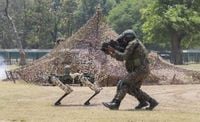In a significant escalation of military tensions, India has launched a counter-offensive against Pakistani targets following a series of drone and missile attacks by Islamabad on Indian cities during the night of May 7-8, 2025. The Indian Defence Ministry confirmed that these attacks aimed at military installations across northern and western India were met with a strong and proportionate military response.
According to statements from the Ministry of Defence, the Pakistani military initiated coordinated strikes targeting key locations, including Srinagar, Jammu, Pathankot, Amritsar, Ludhiana, Chandigarh, and Bhuj. However, these attacks were effectively thwarted by India’s Integrated Counter-UAS Grid and Air Defence systems, which neutralized all incoming threats.
"Debris of these attacks is now being recovered from a number of locations that prove the Pakistani attacks," the ministry noted, underscoring the severity of the situation. In retaliation, Indian armed forces targeted Air Defence Radars and systems at various locations in Pakistan, specifically confirming that an Air Defence system in Lahore had been neutralized.
The ongoing hostilities have led to a tragic loss of life, with the Indian Ministry reporting that 16 innocent civilians, including three women and five children, have been killed due to unprovoked firing from the Pakistani side. The ministry emphasized that India was compelled to respond to halt the mortar and artillery fire from Pakistan.
Despite the escalating conflict, India reiterated its commitment to non-escalation, provided that the Pakistani military reciprocates this principle. The Indian Armed Forces have stated that their response has been focused, measured, and non-escalatory, specifically avoiding targeting Pakistani military establishments.
In light of these developments, authorities across multiple Indian states have implemented precautionary measures, including the closure of schools and educational institutions. This decision was prompted by the launch of Operation Sindoor, a counter-terrorism initiative aimed at addressing the security threats following the deadly Pahalgam terror attack that claimed the lives of 26 civilians just weeks prior.
On May 8, 2025, educational institutions across several districts in Jammu and Kashmir, Punjab, and Rajasthan were ordered to close as a precautionary measure. In the Jammu division, all government and private schools in five key border districts—Jammu, Samba, Kathua, Rajouri, and Poonch—were closed. Similar restrictions were enforced in the Kashmir division, particularly in Baramulla, Kupwara, and Gurez, as well as around Awantipora and Srinagar Airport.
In Punjab, the Ferozepur Deputy Commissioner announced a 72-hour shutdown for all schools starting from May 7, 2025, amidst rising tensions. Educational institutions in Pathankot, Amritsar, Gurdaspur, and Fazilka were also affected, with schools in Tarn Taran extending closures until May 11, 2025.
Rajasthan’s Jodhpur district administration issued orders to suspend all classes starting May 8, 2025, until further notice, affecting both government and private institutions. Schools up to Class 12, alongside Anganwadi centres and madrasas, were closed in Barmer, Bikaner, and Jaisalmer.
The military strikes conducted under Operation Sindoor were a direct response to the Pahalgam attack, which has heightened security concerns along the Line of Control (LoC) and International Border (IB). The precision strikes targeted terror infrastructure, including the Jaish-e-Mohammad headquarters in Bahawalpur and Lashkar-e-Taiba’s operational base in Muridke, marking a significant military action against militant groups.
As the situation continues to evolve, authorities remain on high alert, closely monitoring developments along the border. The Indian government has stressed the importance of maintaining peace and security in the region while also ensuring the safety of its citizens amid these heightened tensions.
In summary, as tensions rise between India and Pakistan, the recent military actions and subsequent school closures reflect the seriousness of the current geopolitical climate. With both nations on high alert, the hope for a peaceful resolution remains, but the path forward is fraught with uncertainty and potential for further conflict.





